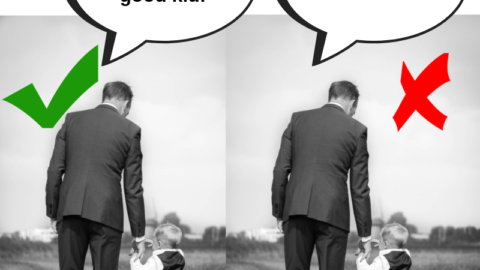Make These Your New Year’s Resolutions…
- Explore and understand that children think differently from adults
- Explore and understand that successful parenting techniques evolve from the perspective that disruptive/challenging behavior is a coping mechanism
- Understand the powerful and positive effects of honoring the child
As you all know, parenting can be a joy and parenting can be hard work. What we sometimes hesitate to talk about is that parenting can also be very frustrating. The answer to the frustration will come from understanding how and why your children think and behave in certain ways—and learning what to do about it.
REMEMBER: Behavior is rarely “random.” Children behave in certain ways to meet a need or communicate how they are feeling.
The most powerful steps that parents can start taking are identifying the reasons for the behavior. With this knowledge, the parent is better able to find the most effective ways to respond to the needs and feelings reflected in those behaviors. This is a skill that requires practice. Your commitment will be one of your most powerful parenting resolutions in the New Year.
The Pillars for Success program is all about identifying and understanding the steps to joyful parenting that come from the intentional and highly effective parenting skills that the program teaches. Although the program is based on 9 Pillars of parenting, we will highlight just three of the Pillars to help you get started and perhaps motivate you to explore the Pillars for Success website. (www.pillarsforsuccess.com)
RESOLUTION #1:
Explore and understand that children think differently from adults
The very first thing a parent has to understand is found in both the title and the content of Pillar 1: Children Think Differently From Adults.
Many insights come when parents recognize and understand that children think differently than adults. Children often misunderstand the parent’s words, and they may even seem to fall on “deaf ears.” Parents often fail to recognize that children are not always developmentally ready to understand the message communicated. Typical childhood development teaches us that all children start out very self-centered and focus on their own needs and wants. Learning to be sensitive to others and caring about how their actions affect other people is achieved based on the life experiences of the child, how he is parented, and the process of developmental brain maturation.
In the meantime, talking to children from an adult point of view and expecting them to understand the message creates frustration. To avoid this frustration, try talking to children from their point of view. (We call that point of view “IAAM,” which means “It’s All About Me!”) In this dialogue, show them how they will benefit by cooperating. Remember, children are very self-centered in their development and focus on their own wants and needs. Eventually, their life’s experiences will teach them to think about other people, what those people need, and how those people feel.
TAKEAWAY: The road to clear communication and positive responses with children is paved with an intentional decision made by an adult to communicate with them based on their needs and their point of view. As they mature they will be able to “see” beyond themselves but for most kids that is not the case until the necessary maturation occurs.
RESOLUTION #2:
Explore and understand that successful parenting techniques evolve from the perspective that disruptive/challenging behavior is a coping mechanism
The next Pillar we’ll cover offers another life-changing insight. The title says it all… Pillar 3: Disruptive/Challenging Behavior is a Way of Coping.
How we view an event determines what we think happened and how we respond to it. If you view your children’s behavior as being rude and demanding, then you will most likely respond with making corrections or even scolding them.
On the other hand, if you view their behavior as an effort to achieve “balance” and/or try to get their needs met you may respond in a very different manner. You may even decide that these negative behavior episodes are actually opportunities to teach children how to get their core needs (listed below) met in acceptable ways. The Pillars for Success program will teach you that there are three basic reasons for disruptive/challenging behavior. All three of them are an attempt on the part of the child to restore a sense of personal balance in one or more of the following areas that we refer to as the “ABC’s of challenging behavior:”
Attention
Basic Survival Needs
Control and Power
Our experience with children of every age and developmental level has taught us that these three needs are universal human needs that a child will try to satisfy with any available behavior. The result: sometimes the child is successful in getting his needs met in acceptable ways and sometimes trying to satisfy these needs leads to extreme and unacceptable behavior. Which parenting approach do YOU think will have more effective results? Dealing with the behavior or teaching the child acceptable ways to get his needs met?!
RESOLUTION #3:
Understand the powerful and positive effects of honoring the child
The final Pillar we will review in this blog post is Pillar 9: Honoring the Child Has Amazing Results.
Appropriately placed as the last Pillar in the series, this Pillar will take you on a journey that summarizes the positive foundation of the training. It examines the power of “thanking the child.” We often take for granted the amazingly positive impact of noticing when a child does the “right” thing even though it may be nothing more than fulfilling a daily expectation. Pillar 9 expands on the value of positive messages and also explores a concept we refer to as “marveling.” Pillar 9 reminds parents of these and other life-changing techniques:
- Thanking the child for trying, for doing part of a task, and having a good idea
- Thanking the child for admitting a lie, for sharing how he felt calmly, for following directions, and for maintaining control
- Catching the child doing the right thing
- Learning to MARVEL. For example, “How did you figure that out? How did you change your mind and decide to help?”
This Pillar begins with emphasizing the power of “honoring the child” and ends with the power of “honoring ourselves, our families, and our best efforts to create a “happy family.” Pillar 9 reminds us of the definition of a “happy family.” The result is each of us gives ourselves permission to define our family as positively as we define other seemingly “perfect” families in spite of their unknown internal struggles, which we never have the opportunity to witness or experience as an outsider.
We’re here to help!
Remember, your dedication to being a loving, caring parent can be supported by the Pillars for Success and the insights and techniques taught within the program. What more effective way could you possibly find to improve both you and your child’s chance for a positive relationship than to learn an entirely new perspective that will lead you to that goal?! Making a commitment to understand your child’s behavior in a new way will be a family resolution for the New Year that you will celebrate the whole year through.













